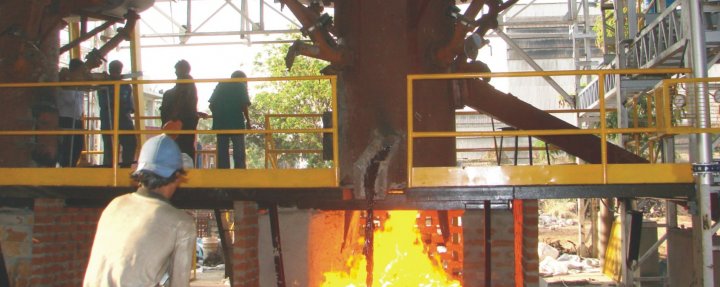- Projects & Programmes
- Upscaling energy efficiency in metal casting in Southern India
Our Portfolio
Upscaling energy efficiency in metal casting in Southern India
Background
The metal casting sector is one of India’s largest energy consumers. Since iron production is often clustered in groups of small and medium-sized enterprises (SMEs), this sector is a good target for energy efficiency (EE) initiatives.
A previous REEEP-funded pilot project worked with a cluster of SMEs in Coimbatore. It developed and installed 8 energy efficient demonstration furnaces and trained around 100 entrepreneurs and shop floor supervisors in their operation, leading to 5 firms in the cluster installing the improved furnaces. By installing the efficient furnaces, the firms were able to achieve energy savings of at least 25 percent. Furthermore, the improved technology was expected to lead to larger outputs which would help the factories take advantage of the growing domestic and international market for South Indian metal products. The new furnaces also improved working conditions and occupational health and safety for the workforce.
This Phase II project aimed to upscale the programme by replicating the same approach with similar metal casting clusters in Southern India, namely in Belgaum, Bangalore (Karnataka); Vijayawada, Hyderabad (Andhra Pradesh); Palakkad (Kerala) and Chennai, Coimbatore (Tamil Nadu).

Outcomes
During the course of the project, the focus was shifted away from the province of Kerala, which has a rather small foundry industry, towards the Kolhapur cluster in the province of Maharashtra, which had not initially been considered part of the project but which showed great potential in terms of scale and enthusiasm of local stakeholders. Most of the energy efficiency pilots carried out during the project were implemented in Maharashtra.
Through this project, 12 energy efficiency pilots were implemented in different clusters, and detailed energy audits were carried out to demonstrate the improved performance of the factories using the new technology. These audits were not only informative for the factories themselves, but also provided case studies which other factories could base their own projects on. Eight new local service providers (LSPs) were established and given training, to provide technical back-up in the clusters during and after the implementation of the energy efficiency technology. Most of these LSPs continued to work with TERI, the implementing partner, after the project finished and continued the distribution of the energy efficient furnaces in their regions. Besides the LSPs, factory operators and supervisors also received intensive hands-on training and high-quality training materials were produced for future capacity building. In total around 250 LSPs and entrepreneurs as well as 400 operators and supervisors received training over the project period.
In order to improve access to financing for SMEs, TERI worked with the Small Industries Development Bank of India (SIDBI) to assist units in accessing financing for their investments. The experience gained was used in a report which could then be used by other factories as a template for accessing commercial finance.
The project also aimed to create an enabling policy environment for energy efficiency projects in SMEs, and involved over 200 stakeholders from government, financial institutions and industry representatives in four state-level policy forums to generate awareness of the benefits of these projects. Another event organised by the project was a national-level workshop, which was attended by around 100 decision makers from funding and implementing agencies involved in the MSME sector in general and the metal castings sector in particular.
TERI signed Memorandums of Understanding with several state level agencies which agreed to raise awareness of the benefits of these energy efficiency solutions amongst policy makers and other decision-makers. The agencies included the PSG College of Technology in Tamil Nadu and the Andhra Pradesh Industrial and Technical Consultancy Organisation Ltd. in Andhra Pradesh.
Finally, TERI put significant efforts into promotion and dissemination, in order to reach out to as many factories and stakeholders as possible. The project successfully demonstrated the advantages of the use of energy efficient technologies. It helped increase the capacity and confidence levels of the LSPs and encouraged foundry owners to invest in similar technologies in their own factories. An impact assessment carried out a number of years after the project finished found that the project had a long-term positive impact on the rate of adoption of energy efficiency solutions in Indian metal-casting clusters.